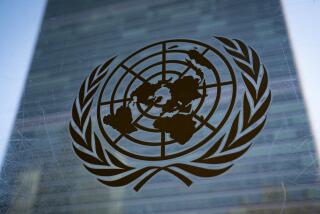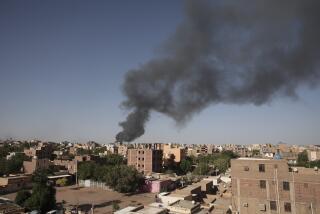U.N. to Pull Britons, Americans From Iraq
- Share via
UNITED NATIONS — Bowing to Baghdad’s threats, the United Nations announced Wednesday that it will no longer allow U.S. and British citizens to participate in its humanitarian programs in Iraq.
A month ago, the government of Iraqi President Saddam Hussein had moved to oust a small group of Britons and Americans, saying it could not guarantee their safety because of “deep popular anger” over mid-December airstrikes by the U.S. and Britain.
Initially, U.N. officials stood firm, insisting that only they could decide the composition of the staff. But Benon Sevan, the international body’s security chief, changed his mind and advised Secretary-General Kofi Annan on Wednesday that the remaining staffers should leave.
Wednesday’s order affects only two U.S. citizens in Baghdad. Officials said the others involved already had left Iraq.
Annan spokesman Fred Eckhard said Iraqi officials had made “numerous requests” in meetings in New York and Baghdad for the workers to leave Iraq.
“It was clear the government was not going to reverse its decision, though it did advise the U.N. that [a few] U.S. nationals could remain in Baghdad,” Eckhard said.
“However, Mr. Sevan did not accept that security considerations could be applied selectively, and he recommended to the secretary-general that all U.S. and U.K. nationals leave the country as a matter of principle,” he added. “The secretary-general accepted the recommendation.
“The specific threats were to these two nationalities, so it was the security coordinator’s call,” Eckhard said.
Before the attacks by U.S. and British forces in December, there were as many as 15 nationals of the two countries among the U.N. staff in Iraq.
Reaction in Washington and London was muted.
A spokesman for the British Foreign Office said the United Nations was “left with little choice,” charging that “it is absurd for [Iraq’s] government to claim it can’t protect a few individuals.”
State Department spokesman James P. Rubin said that the U.N. acted because of a lack of security guarantees and that it was “not some new problem.” At the White House, Press Secretary Joe Lockhart said the Clinton administration understood the safety concerns, and he stressed that the evacuation was not linked to an impending attack on Iraq.
After Baghdad raised the issue Jan. 4, U.N. legal counsel Hans Corell said it was the responsibility of Iraq to protect all members of the international organization’s staff.
The United Nations has 420 people operating its oil-for-food program in Iraq. The program allows Hussein to sell a set dollar amount worth of oil every six months to buy the basics of life for Iraqi citizens.
Iraq has been under strict U.N. sanctions since it invaded neighboring Kuwait in 1990.










